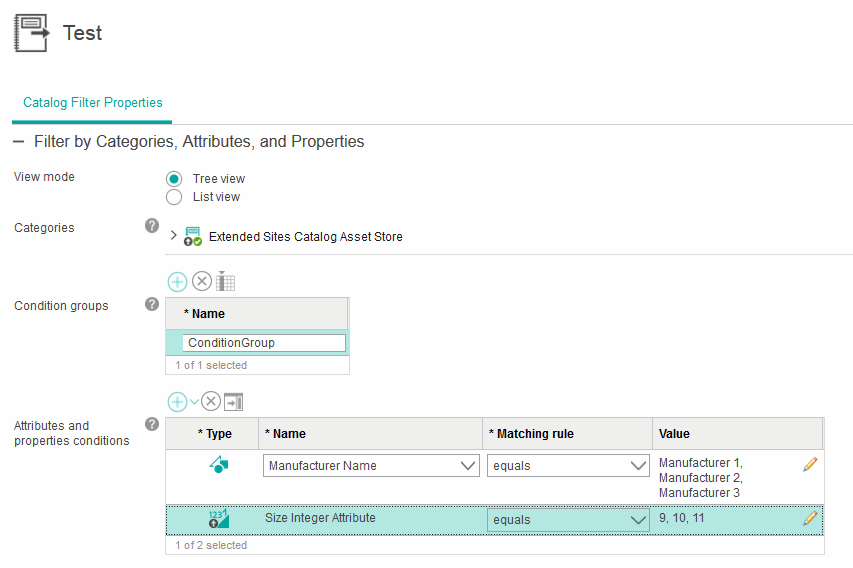
Attribute dictionary attribute and property conditions in catalog filters
When you include or exclude categories in your catalog filter, you can specify which catalog entry properties or attributes to include or exclude. To include or exclude categories, define conditions on the categories in the catalog filter. A condition can contain attribute dictionary attributes or catalog entry properties.
- Add a category to the catalog filter.
- Define a condition group.
- Specify one or more attribute dictionary attributes or catalog entry property conditions within the condition group.
Conditions can also be applied to the entire catalog. If you use a condition on a category, the filter includes or excludes the products that meet the condition.
In
a catalog filter, the whole catalog is included by default. If you
apply the condition Manufacturer Name equals IBM to
the top level (the whole catalog), then the filter would include all
IBM products and nothing else.
Catalog entry property conditions
By default, the following catalog entry properties are supported: Product Part Number, Manufacturer Part Number, and Manufacturer Name.| Condition name | Description | Matching rules |
|---|---|---|
| Product Part Number | The part number (code) for the catalog entry | Equals, does not equal |
| Manufacturer Part Number | The part number that is given by the manufacturer | Equals, does not equal |
| Manufacturer Name | The name of the manufacturer | Equals, does not equal |
CG02and contains a catalog entry property condition of
Manufacturer Name equals Maplewear.

Attribute dictionary attribute conditions
You can specify both descriptive and defining attributes. The attributes must be defined in the attribute dictionary and be searchable. When you specify an attribute with predefined values, select attribute values from a list.
The following screen
capture shows you an example of an attribute dictionary attribute
condition. In this example, the condition group is named CG01
and
contains an attribute dictionary attribute condition of Color equals
White
.

Multiple conditions within a condition group
If you create multiple conditions in a condition group, then all the conditions must be satisfied for the inclusion or exclusion operation to occur.
- The manufacturer name is one of the following values: Manufacturer 1, Manufacturer 2, or Manufacturer 3
- The size is one of the following values: 9, 10, or 11

Multiple condition groups within a catalog filter
If you create multiple condition groups, only one condition group must be satisfied for the inclusion or exclusion operation to occur.
- If a catalog entry is assigned the White value for the Color attribute, it is included in the catalog filter.
- If a catalog entry has a manufacturer name
Maplewear
, it is included in the catalog filter.

